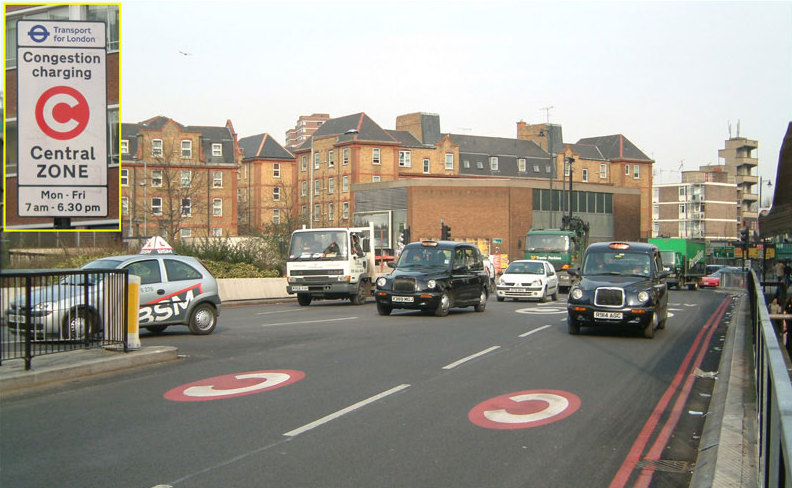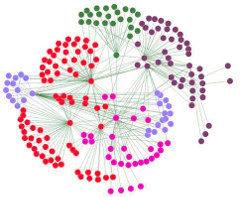What if the city ran Waze and you had to obey it? Could this cure congestion?
Submitted by brad on Fri, 2016-12-02 00:42I believe we have the potential to eliminate a major fraction of traffic congestion in the near future, using technology that exists today which will be cheap in the future. The method has been outlined by myself and others in the past, but here I offer an alternate way to explain it which may help crystallize it in people's minds.
Today many people drive almost all the time guided by their smartphone, using navigation apps like Google Maps, Apple Maps or Waze (now owned by Google.) Many have come to drive as though they were a robot under the command of the app, trusting and obeying it at every turn. Tools like these apps are even causing controversy, because in the hunt for the quickest trip, they are often finding creative routes that bypass congested major roads for local streets that used to be lightly used.

Put simply, the answer to traffic congestion might be, "What if you, by law, had to obey your navigation app at rush hour?" To be more specific, what if the cities and towns that own the streets handed out reservations for routes on those streets to you via those apps, and your navigation app directed you down them? And what if the cities made sure there were never more cars put on a piece of road than it had capacity to handle? (The city would not literally run Waze, it would hand out route reservations to it, and Waze would still do the UI and be a private company.)
The value is huge. Estimates suggest congestion costs around 160 billion dollars per year in the USA, including 3 billion gallons of fuel and 42 hours of time for every driver. Roughly quadruple that for the world.
Road metering actually works
This approach would exploit one principle in road management that's been most effective in reducing congestion, namely road metering. The majority of traffic congestion is caused, no surprise, by excess traffic -- more cars trying to use a stretch of road than it has the capacity to handle. There are other things that cause congestion -- accidents, gridlock and irrational driver behaviour, but even these only cause traffic jams when the road is near or over capacity.
Today, in many cities, highway metering is keeping the highways flowing far better than they used to. When highways stall, the metering lights stop cars from entering the freeway as fast as they want. You get frustrated waiting at the metering light but the reward is you eventually get on a freeway that's not as badly overloaded.
Another type of metering is called congestion pricing. Pioneered in Singapore, these systems place a toll on driving in the most congested areas, typically the downtown cores at rush hour. They are also used in London, Milan, Stockholm and some smaller towns, but have never caught on in many other areas for political reasons. Congestion charging can easily be viewed as allocating the roads to the rich when they were paid for by everybody's taxes.
A third successful metering system is the High-occupancy toll lane. HOT lanes take carpool lanes that are being underutilized, and let drivers pay a market-based price to use them solo. The price is set to bring in just enough solo drivers to avoid wasting the spare capacity of the lane without overloading it. Taking those solo drivers out of the other lanes improves their flow as well. While not every city will admit it, carpool lanes themselves have not been a success. 90% of the carpools in them are families or others who would have carpooled anyway. The 10% "induced" carpools are great, but if the carpool lane only runs at 50% capacity, it ends up causing more congestion than it saves. HOT is a metering system that fixes that problem.





 One can understand the appeal of presenting the simulation in a mostly real environment. But the advantages of the VR experience are many. In particular, with the top-quality, retinal resolution light-field VR we hope to see in the future, the big advantage is you don't need to make the physical things look real. You will have synthetic bodies, but they only have to feel right, and only just where you touch them. They don't have to look right. In particular, they can have cables coming out of them connecting them to external computing and power. You don't see the cables, nor the other manipulators that are keeping the cables out of your way (even briefly unplugging them) as you and they move.
One can understand the appeal of presenting the simulation in a mostly real environment. But the advantages of the VR experience are many. In particular, with the top-quality, retinal resolution light-field VR we hope to see in the future, the big advantage is you don't need to make the physical things look real. You will have synthetic bodies, but they only have to feel right, and only just where you touch them. They don't have to look right. In particular, they can have cables coming out of them connecting them to external computing and power. You don't see the cables, nor the other manipulators that are keeping the cables out of your way (even briefly unplugging them) as you and they move. To be clear, comma is a tiny company taking a radical approach, so it is not a given that what NHTSA has applied to them would have been or will be unanswerable by the big guys. Because Tesla's autopilot is not a pure machine learning system, they can answer many of the questions in the NHTSA letter that comma can't. They can do much more extensive testing that a tiny startup can't. But even so a letter like this sends a huge chill through the industry.
To be clear, comma is a tiny company taking a radical approach, so it is not a given that what NHTSA has applied to them would have been or will be unanswerable by the big guys. Because Tesla's autopilot is not a pure machine learning system, they can answer many of the questions in the NHTSA letter that comma can't. They can do much more extensive testing that a tiny startup can't. But even so a letter like this sends a huge chill through the industry. Of course, for the social site to aggregate and use this data for its own purposes would be a gross violation of many important privacy principles. But social networks don't actually do (too many) things; instead they provide tools for their users to do things. As such, while Facebook should not attempt to detect and use political data about its users, it could give tools to its users that let them select subsets of their friends, based only on information that those friends overtly shared. On Facebook, you can enter the query, "My friends who like Donald Trump" and it will show you that list. They could also let you ask "My Friends who match me politically" if they wanted to provide that capability.
Of course, for the social site to aggregate and use this data for its own purposes would be a gross violation of many important privacy principles. But social networks don't actually do (too many) things; instead they provide tools for their users to do things. As such, while Facebook should not attempt to detect and use political data about its users, it could give tools to its users that let them select subsets of their friends, based only on information that those friends overtly shared. On Facebook, you can enter the query, "My friends who like Donald Trump" and it will show you that list. They could also let you ask "My Friends who match me politically" if they wanted to provide that capability.
 Recordings of mundane driving activity are less exciting and will be easier to gather. Real world incidents are rare and gold for testing. The sharing is not as golden, because each vehicle will have different sensors, located in different places, so it will not be easy to adapt logs from one vehicle directly to another. While a vehicle system can play its own raw logs back directly to see how it performs in the same situation, other vehicles won't readily do that.
Recordings of mundane driving activity are less exciting and will be easier to gather. Real world incidents are rare and gold for testing. The sharing is not as golden, because each vehicle will have different sensors, located in different places, so it will not be easy to adapt logs from one vehicle directly to another. While a vehicle system can play its own raw logs back directly to see how it performs in the same situation, other vehicles won't readily do that. Make no mistake, the cost will be real. The cost of regulations is rarely known in advance but it is rarely small. Regulations slow all players down and make them more cautious -- indeed it is sometimes their goal to cause that caution. Regulations result in projects needing "compliance departments" and the establishment of procedures and legal teams to assure they are complied with. In almost all cases, regulations punish small companies and startups more than they punish big players. In some cases, big players even welcome regulation, both because it slows down competitors and innovators, and because they usually also have skilled governmental affairs teams and lobbying teams which are able to subtly bend the regulations to match their needs.
Make no mistake, the cost will be real. The cost of regulations is rarely known in advance but it is rarely small. Regulations slow all players down and make them more cautious -- indeed it is sometimes their goal to cause that caution. Regulations result in projects needing "compliance departments" and the establishment of procedures and legal teams to assure they are complied with. In almost all cases, regulations punish small companies and startups more than they punish big players. In some cases, big players even welcome regulation, both because it slows down competitors and innovators, and because they usually also have skilled governmental affairs teams and lobbying teams which are able to subtly bend the regulations to match their needs.
 Here are some basic models of cost. I compare a low-cost 1-2 person robotaxi, a higher-end 1-2 person robotaxi, a 4-person traditional sedan robotaxi and the costs of ownership for a private car, the Toyota Prius 2, as
Here are some basic models of cost. I compare a low-cost 1-2 person robotaxi, a higher-end 1-2 person robotaxi, a 4-person traditional sedan robotaxi and the costs of ownership for a private car, the Toyota Prius 2, as